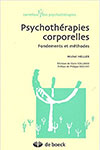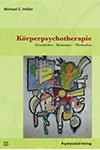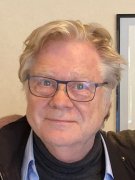Textes
J’ai la permission de rendre ces textes disponibles pour
toute personne privée qui veut entrer en discussion avec ma
pensée.
Ces textes ne peuvent pas être utilisés sur un autre site
web ou dans une publication sans mon autorisation et celle
de mes éditeurs.
Michel Heller
-
La programmation comme microscope du comportement communicatif corporel27.01.2024Michel HellerComment l'intelligence artificielle peut nous aider à étudier l'organisation inconsciente du comportement ?
-
Approche organismique des troubles fonctionnels complexes15.11.2023Michel HellerPrésentation faite jeudi 16 novembre 2023, durant le symposium de l'Unité de Réadaptation Psychosomatique (UPSO) de la Clinique Le Noirmont, intitulé: Pour une nouvelle psychosomatique: le souffle entre la tête et les jambes.
-
MARGARET MEAD & DES DIFFICULTÉS D’AVOIR UN ENFANT02.02.2023Michel HellerReprise d'une émission de radio en 1979 sur la RTS. Il s'agit de montrer comment le point de vue d'une anthropologue comme Margaret Mead peut inspirer les psychologues qui soutiennent les parents pour qui encadrer leurs enfants est problématique.
-
Pratiques psycho-corporelles & troubles fonctionnels de l’organisme08.12.2022Michel HellerPrésenmtation avec Duc Lê Quang et Yvon Mouster à la journée de formation du Groupement des Psychiatres de Neuchâtel, le 8 décembre 2022.
-
Pratiques psycho-corporelles & troubles fonctionnels de l’organisme08.12.2022Michel HellerPrésentation avec Duc Lê Quang et Yvon Mouster à la journée de formation du Groupement des Psychiatres de Neuchâtel, le 8 décembre 2022.
-
100 ans de psychothérapies corporelles: de l’étude des névroses à celle des troubles de la personnalité, en passant par Wilhelm Reich05.11.2022Michel HellerPrésentation pour l'École de Sophro-Bio-Dynamique de Genève, 34ème Journée de formation post-graduée et continue, 5 novembre 2022. Les divers abords thérapeutiques des addictions. Organisé par l'ASMPP. Présentateurs: Jean Bernard Daeppen, Frederico Seràgnoli, Michel Heller, Ayala Borghini et Lucien Gamba. 10 heures.
-
Postface30.09.2022Michel HellerHeller M. (2022). Postface. Dans Rubens Kignel: Résonance. Le corps, une vie à découvrir: 149-164. Les Éditions Biodynamiques. Éloge de l'approche humanistique de Rubens Kignel en psychothérapie corporelle.
-
L'Oeil d'Atoum26.09.2022Michel HellerLégende égyptienne inspirée par R.T. Rundle Clark (1978), Myth and symbol in Ancient Egypt.
-
Descartes on the body-mind split01.01.2021Michel HellerThis article, in English, describes Descartes as a founder of scientific medicine, which aims to integrate the body's systems through passions. It summarises a chapter in a forthcoming French volume, published by l'Harmattan: L'organisme intime. Cet article, anglais, décrit Descartes comme un savant qui a milité pour la création d’une médecine scientifique, qui vise l’intégration des systèmes de l’organisme par les passions. Il résume un chapitre d’un ouvrage français à paraître chez l'Harmattan: L'organisme intime.
-
I.5 Conclusion sur Descartes: la différenciation et le Coronavirus I.5.1 Bio- psycho- et socio-logiques : ≠11.04.2020Michel HellerExtrait L'Organisme Intime (2022). Une remarque inspirée par un chapitre sur Descartes, concernant le coronavirus et incompatibilité entre bio- psycho- et socio- logiques.
-
The embodied psyche of organismic psychology: a possible frame for a dialogue between psychotherapy schools and modalities17.12.2017M. C. HellerThe article has been published by the International Body psychotherapy Journal (15, 1: 20-50). This version includes a few corrections. I sometimes revise its content. The date of the latest revision is at the end of the title, and the modifications are in blue.
-
Body Psychotherapy from Pierre Janet onwards: an enquiry on the dynamics of psychological states22.07.2017Michael Coster HellerThe most recent version of the text is the present one. It began as a mix between preparatory texts and power points used for conferences given during the autumn of 2014, in Lisbon and Utrecht, for body psychotherapists and clinical psychologists. It revisits the evolution of psychotherapy methods from Janet to today, passing through psychoanalysis, behaviorism, neo-reichian therapies, nonverbal communication analysis as well as other points of view, focusing on how psychotherapy and experimental psychology can associate. The text has not been polished. It is still in a raw state. However, it may contain interesting bits and pieces, which is why I publish it on the web. Certain parts have not yet been published. A shorter and more rigorous version of this content should be published in the International Body psychotherapy Journal, at the end of 2015. As I keep modifying this text, I have noticed that it is gradually becoming an Essay on Psychology and Psychotherapy concerning the art of passing from one psychological state to an other.
-
Plato for Psychotherapists25.03.2017Michel HellerThis is a rewriting of my chapter on Plato published in Body Psychotherapy: history, concepts & methods, W. W. Norton, 2012. It still needs some editing. Most references are in the volume.
-
Common Ground in Body Psychotherapy: a dialogue and debate01.10.2016Sheila Butler (ed.) with Sheila Butler, Luisa Barbato, Ulfried Geute,r Michel Heller, Eleni Stavroulaki, Judyth WeaverA Follow-up (‘dialogos’ - διάλογος) to the Roundtable presented at the EABP Conference in Athens – in October 2016, published on the EABP website in April 2017.
-
Exposition des peintures de Nicole Clerc13.08.2016Nicole Clerc-HellerL'exposition à lieu au Restaurant de Bois-Genoud Route de Bois Genoud 36 1023 Crissier
-
The embodied psyche of organismic psychology: a possible frame for a dialogue between psycho-therapy schools and modalities01.05.2016Michael C. HellerIn this paper I describe the clinical utility of situating all psychological routines within the realm of cogwheels that allow an organism to function as it does. Published by the IBPJ.
-
The System of the Dimensions of the Organism (SDO): a common vocabulary for body psychotherapy19.04.2016Michael Coster Heller and Gill WestlandSlightely revised version of: Heller, Michael Coster & Westland, Gill (2011). The System of the Dimensions of the Organism (SDO): a common vocabulary for body psychotherapy. Body, Movement and Dance in Psychotherapy, 6, 1. 43 – 57.
-
CORPS ET ÉVALUATION DE PSYCHOTHÉRAPIES : UN RÊVE A REALISER01.03.2016Michel HellerDescription d'une projet d'étude du comportement facial de patients suicidaires effectué au Laboratoire Affect et Communication avec la doctoresse Yvonne Gitnacht et Christine Lessko.
-
System of Dimensions of the Organism01.05.2014Michael Heller interviewd by Nancy EichhornNancy forces Michael to explain his SOD model for psychotherapy as clearly as possible for Somatic psychotherapy Today!
-
EESP-Gestion du stress de l'intervenant18.03.2014Michel HellerTextes pour des cours sur la gestion du stress dans des situations de crises pour assistants sociaux et pédagogues, donnés à l'EESP de Lausanne
-
Science et acupuncture : la sagesse des grands savants et la science des grands sages (text)17.10.2013Michel HellerPrésentation faite à la clinique Le Noirmont dans le Jura suisse.Avec ajout de thèmes qui n'ont finalement pas été présentés.
-
Idealism & The Goals of a Psychotherapeutic Process (revized in 2017, August)01.10.2013Michael C. HellerA discussion of why it is so difficult to give a simple listing of the aims of a psychotherapeutic cure. This well known issue is aproached through a discussion of the impact of Plato's Idealism on psychotherapeutic thinking.Some revisions have been added since. Heller, M. C. (2013). Idealism & The Goals of a Psychotherapeutic Process. International Body Psychotherapy Journal, 12, 2, 9-38.
-
Les Psychothérapies corporelles02.12.2012Interview de Michel Heller avec Serge PrengelPrésentation de l'ouvrage que j'ai écrit sur les psychothérpies corporelles pour les éditions De Boeck.
-
Introduction au reflex de sursaut (texte)18.05.2012Michel HellerIntroduction du travail sur le reflex de sursaut en psychologie Biodynamique.
-
Modes d’intervention sur le stress en thérapie psychocorporelle19.11.2011Michael HellerSystème des dimensions de l'organisme et stress. Les modes d'interventions que le psychologue corporelle utilise quand il travail avec le trauma.
-
Elsa Gindler and her influence on Wilhelm Reich and body psychotherapy11.04.2010Geuter, Ulfried; Heller, Michael Coster; Weaver, Judyth O.Published by Body, Movement and Dance in PsychotherapyT, 5, 1: 59 – 73.
-
Micro- et Macro- pratiques en psychothérapie corporelle (15.09.2007):15.09.2008Michel HellerPrésentation d’un cas en psychothérapie, pour lequel il était utile d’utiliser se système de codage FACS d’Ekman et Friesen.
-
A topography of the mind16.05.2008Michael Coster HellerThis paper distinguishes the self, interpersonal and social regulation systems of an individual organism.It focuses on the analysis of interpersonal resonance, intersubjectivity and secrets for psychotherapy. Revised in 2009. It was printed in the USA Body psychotherapy Journal, Vol 5, No 2. As the journal does not exist anymore, I put here the whole number, so that readers can become familiar with other body psychotherapy litterature.
-
THE JELLYFISH EXERCISES AND THE REICHIAN WORLD OF GERDA BOYESEN15.02.2008Michael Coster HellerMy newest (2008) working document on the reichian jellyfish exercises.
-
Introducing the System of Organismic Dimensions (SOD)19.08.2007Michael Coster HellerPower Point presentation used for my conferences in Brazil, in August 2007.
-
Darwin and the animal nature of the human soul04.01.2006Michael Coster Heller
Comments on the fuzziness of Darwin’s theory of the human mind and emotions, and of its relevance for contemporary psychology.
-
La sexualité en tant que penchant01.12.2005Michel Coster HellerLa sexualité comme exemple de propensions instinctive, qui enchaîne une grande diversité de mécanismes hétéroclites intérieures et sociaux pour se réaliser. Suite de Ce que le corps nous enseigne sur la topique de l'âme.
-
What the Face Reveals Basic and Applied Studies of Spontaneous Expression Using the Facial Action Coding System (FACS)10.10.2005Paul Ekman and Erika L. Rosenberg (Ed.)As the book can be downloaded on the web, and as it contains articles written by Veronique Haynal and myself, I include it in the aqualide web site. It contains several highly interesting articles written by colleagues.
-
A topography of the mind (filmed conference)01.10.2005Michael C. HellerThe subject is analyzing how two minds can interact. http://youtu.be/wGbCe2E8zjI Film maid for the 2005 Congress of the International Association of Body psychotherapy in Sao Paulo (Brazil). The subject is analyzing how two minds can interact.
-
The Golden Age of Body Psychotherapy in Oslo12.06.2005Michael Coster HellerPresentation made in Oslo in June 2005, at the Oslo University College (HiO) meeting on The European Tradition meets the Norwegian Tradition of Body Work ,10th – 12th of June 2005. The realm of body psychotherapy in Oslo from 1940 to 1960, and the origines of Biodynamic Psychology. Extensively revised in 2009.
-
Marc Archinard et l'organisme en interaction02.02.2005Michel Coster HellerCet article rend hommage à Marc Archinard, en proposant un modèle qui permet d'éviter les pièges d'une psychosomatique simpliste. Il montre que le rapport psyché & somma ne peut se comprendre qu'à l'intérieur de considérations sur le rapport entre mœurs sociaux et physiologie.
-
Depression in Suicide Faces in What the Face Reveals01.01.2005Michael Heller and Véronique Haynal-ReymondNow that it is on the net, I put on my web site the article Veronique Haynal and I wrote on Depression in Suicide Faces and published in What the Face Reveals, published by Paul Ekman and Erika Rosenberg in Oxford University press. The whole volume is in this pdf file.
-
Le Platon du Psy01.01.2005Michel Coster HellerDans ce livre, j’explore quelques thèmes de psychologie et de psychothérapie pour lesquels une relecture de Platon demeure instructive. cet ouvrage essaye de montrer pourquoi aujourd'hui un dialogue en philosophie, psychologie et psychothérapie demeure nécessaire et instructif. L’éditeur initial de cet ouvrage m’ayant fait faux-bon, ce texte est à la recherche d’un éditeur.
-
The postural dynamics of a psychoanalytical process10.11.2004Michael Coster HellerThis article shows how the tools forged by research on nonverbal communication can usefully complement the vision forged by a psychotherapist of a process she is involved in.
-
Ce que le corps nous enseigne sur la topique de l'âme01.06.2004Michel Coster HellerCet article différencie de façon explicite les notions de nonconscient et d’inconscient, puis explore les implications de cette distinction pour les théories sur la conscience et pour les théories en psychologie et en psychothérapie.
-
Approches psycho-corporelles et psychiatrie13.05.2004Michel Coster HellerPourquoi il est si difficile de produire des méthodes thérapeutiques psycho-corporelles utilisables à grande échelle en psychothérapie ?
-
Les différentes peurs distinguées en psycho-neurologie et les dimensions thérapeutiques qui leurs correspondent05.01.2004Michel Coster HellerPeurs du tronc cérébral, du système limbique et du néo-cortex; associées aux mémoires explicites, participantes et implicites de Fogel. Ces distinctions sont associées à des options de psychothérapie.
-
Body Psychotherapy is a Psychotherapy01.01.2001Gerda BoyesenOne of Gerda Boyesen's last article.
-
The Organism as Physiology, Body, Flesh & Soul01.01.2001Michael HellerBody psychotherapy in 2000.
-
Dynamiques expressives01.02.2000Michel HellerExemples du répertoire expressif de patients dépressifs
-
FACES OF SUICIDAL PATIENTS01.09.1999Michael Heller, Véronique Haynal-Reymond, André Haynal, Marc Archinard & Danièle Chevey-BuchsResearch report on a study made at the LAC (IUPG) on the facial behavior of suicidal patients
-
Can Faces Reveal Suicide Attempt Risks?09.02.1999Michael Heller, Véronique Haynal-Reymond, André HaynalNonconscious mimics observed on persons who just made a suicide attempt and their therapist may allow one to know which patients will make an other attempt and which will not.
-
Hommage pour les 100 ans de Reich : L’autorégulation entre organismes humains01.01.1998Michel Heller01.01.1998: Hommage pour les 100 ans de Wilhelm Reich.
-
L'ombre parentale et le complexe d'Œdipe06.01.1997Michel Coster HellerLa position parentale impose à l’individu qui l’occupe une série d’exigences assez difficile à agender de façon cohérente. Il s’ensuit un certain nombre d’anxiétés existentielles inévitables que cet article essaye de situer.
-
Notes de lecture: Jérome Liss, Maurizio Stupiggia & coll.01.01.1997Michel HellerCommentaires sur l'ouvrage des auteurs.
-
La normalité sexuelle pour un psychologue psychothérapeute03.01.1996Michel Coster HellerSexualité & psychothérapie
-
La pratique de l'aqualide01.03.1995Michel HellerCeci est une de mes premières présentations de l’idée qu’il existe dans l’organisme des mécanismes qui éditent les pensées et perceptions conscientes.
-
Der Jelly-Fish01.01.1994Michael Heller
Der Jelly-Fish oder die reichianische Welt der Gerda Boyesen. In this article I present a detailed description of how jellyfish exercises were develloped by Wilhelm Reich, Gerda Boyesen and myself.
-
DER01.01.1994Michael HellerÜbersetzung: Bernhard Maul -Energie & Charakter, Zeitschr. f. Biosynthese u. Somatische Psychotherapie, Bd.9, Berlin 1994
-
Hommage à Hugo Solms01.05.1993Michel HellerAdire,9, pp. 179-181.
-
What do Science and psychotherapy have to learn about each other?01.01.1993Michael HellerThe transcription of a conference on science and love, given at a conference for body psychotherapists
-
Transfert & contre-transfert : notions générales01.01.1993Michel HellerDans cet article je définis les notions de transfert et de contre-transfert de façon à rendre ces notions utilisables en dehors du cadre psychanalytique.
-
The faces of suicide01.01.1993Michael Coster HellerA research report on the facial expressions of patients who recently attempted to suicide.
-
Unconscious Communication06.06.1992Michael HellerUnconscious and nonconscious communication in nonverbal communication
-
L'inconscient01.04.1992Michel HellerDans le même numéro d'Adire, Paul Fraisse présente sa vision du nonconscient. Grâce à lui, je modifierai ensuite considérablement ma vision de l'inconscient, sans toute fois renier tous ce qui était déjà en place pour cet article.
-
AIMER C’EST DÉJÀ MÉSUTILISER: ÉTHIQUE, AMOUR ET PSYCHOTHÉRAPIE01.01.1992Michel HellerL'abus en psychothérapie corporelle
-
Unconscious Communication01.01.1992Michael HellerOriginally: Heller M. 1992: Unconscious communication. In Maul B. (ed), Body Psychotherapy or the Art of Contact. Berlin: Verlag Bernhard Maul and Energy & Character. I presented this paper in the Strasburg EABP congress, and Bernhard Maul’s book presents other interventions as well. Some minor improvements have been included.
-
Les émotions : un parcours littéraire pour psychothérapeutes01.12.1991Michel HellerTranscription peu éditée d’une conférence donnée en décembre 1991 à Paris, qui sera publiée avec les références suivantes : Les émotions. un parcours littéraire pour psychothérapeutes. Dans Besson, Jacqueline (ed.), Manuel d'enseignement de l'École Française d'Analyse Psycho-Organique, tome 2, p. 12—158, 1992. Texte révisé en Mars 2016
-
Postural Dynamics and Social Status, part I15.11.1991Michael HellerPhD research that aims on defining what postural dynamics is about, by analzing video recordings of interactions of people who have the same social status, or who do not have the same status. For private use only. The copyright is mine. The text cannot be sold without my permission.
-
Postural Dynamics and Social Status, part VI01.11.1991Michael HellerPhD research that aims on defining what postural dynamics is about, by analzing video recordings of interactions of people who have the same social status, or who do not have the same status.
-
Postural Dynamics and Social Status, part V01.11.1991Michael HellerPhD research that aims on defining what postural dynamics is about, by analzing video recordings of interactions of people who have the same social status, or who do not have the same status.
-
Postural Dynamics and Social Status, part IV01.11.1991Michael HellerPhD research that aims on defining what postural dynamics is about, by analzing video recordings of interactions of people who have the same social status, or who do not have the same status.
-
Postural Dynamics and Social Status, part III01.11.1991Michael HellerPhD research that aims on defining what postural dynamics is about, by analzing video recordings of interactions of people who have the same social status, or who do not have the same status.
-
Postural Dynamics and Social Status, part II01.11.1991Michael HellerPhD research that aims on defining what postural dynamics is about, by analzing video recordings of interactions of people who have the same social status, or who do not have the same status.
-
Editorial: Adire n. 601.10.1991Michel HellerÉtat des connaissances en Psychologie Biodynamique française, en 1990.
-
LA PRATIQUE DE LA RESPIRATION EN PSYCHOLOGIE BIODYNAMIQUE01.10.1991Michel HellerDécris l'utilisation de la respiration dans la Psychologie Biodynamique de Gerda Boyesen, pour les élèves qui suivent les cours dans l'école d'Analyse Psycho-Organique.
-
The serotonin model of suicidal propensities01.09.1991Michael Heller
A model on how suicidal behaviour could be understood, using studies on the influence of serotonin on behaviour available at the beginning of the 1990s. Although new studies show that more complex physiological mechanisms are involved, some aspects of this article remain relevant.
-
Introducing Postural Dynamics11.01.1991Michael Coster Heller
This is a working document which summarizes the basic principles of Postural Dynamics theory, model and coding system. The aim of this model is to code bodily behaviour as a postural structure, which coordinates physiological, psychological and communicative functions of an organism.
-
Facial behavior of Suicidal Patients01.11.1990Michael Heller & Christine Lesskoesearch report of the Laboratory of Affect and Communication (L.A.C.), in the Geneva Psychiatric University Institutions.
-
Sexualité et pratique01.05.1989Michel HellerArticle résumant ce qui j'ai dit à une réunion de l'association francophone de psychologie biodynamique sur le thème de la sexualité. Publié dans Psychologie Biodynamique, Journal Interne, 17, Octobre 1989 : pages 5-11.
-
Ethique & Ouverture01.01.1989Michel Coster HellerLa notion d’ouverture en psychothérapie est associée à la notion de déflux proposée par Gerda Boyesen. Les implications éthiques de cette façon d'aborder l'ouverture sont ensuite discutées.
-
The eye block, schizophrenia and autism: a study on interdisciplinarity (revised in 2008)01.01.1987Michael Coster HellerOn the coordination of methods used in Body Psychotherapy, Ethology and studies of nonverbal behavior. The topic is illustrated by what is known on how gaze participates in the communication strategies of autistic and schizophrenic patients. (last revision:26.07.2005)
-
TRANSFERENCE IN BIODYNAMIC PSYCHOLOGY04.11.1986Gerda Boyesen, interviewed by Michael HellerThis interview was published in the review Adire, volume 2, which was a special number on "body & transference"
-
La Psychologie Biodynamique Hier et Aujourd'hui01.10.1982Michel HellerRésumé de ce qu'est la Psychologie Biodynamique proposé à la première réunion de l'Association de Psychologie Biodynamique Francophone, à Montailleur, en 1981.
-
Photo of Bruno Walter, dedicated by him to Hugo Heller in Vienna, 21.II.1921. The original is a part of the material Vienna’s intellectual history inherited by Yvon and Michael Heller.21.02.1921Bruno Walter
Photo de Bruno Walter dédiée par lui à Hugo Heller à Vienne, le 21.II.1921. L’original fait parti du matériel sur l’histoire intellectuelle de Vienne hérité par Yvon and Michel Heller.
-
Darwin's letter to Neumayr I16.01.1879Charles DarwinThis is the original of a letter adressed by Charles Darwin to Melchior Neumayr, the Viennese archaeologist, written on January 15 1879. This letter is unknown and unpublished in tis original form. It now belongs to Yvon and Michael Heller, who received it from their father Clemens Heller, son of Edwig Theresia Neumayr and Hugo Heller. It was found in a volume of the third edition (1861) of The Origin of Species, which contains numerous manuscript corrections probably made by Charles Darwin. Eric Brian (personal communication) suggests that the volume was probably used for the first German translation of The Origin of Species, made in Heidelberg
-
Darwin's letter to Neumayr III15.01.1879Charles DarwinThis is the original of Charles Darwin’s letter to Melchior Neumayr, the Viennese archaeologist, written on January 15 1879. It now belongs to Yvon and Michael Heller, who received it from their father Clemens Heller, son of Edwig Theresia Neumayr and Hugo Heller. It was found in a volume of the third edition (1861) of The Origin of Species, which contains numerous manuscript corrections probably made by Charles Darwin. Eric Brian (personal communication) suggests that the volume was probably used for the first German translation of The Origin of Species, made in Heidelberg.
-
Darwin's letter to Neumayr II15.01.1879Charles DarwinThis is the original of Charles Darwin’s letter to Melchior Neumayr, the Viennese archaeologist, written on January 15 1879. It now belongs to Yvon and Michael Heller, who received it from their father Clemens Heller, son of Edwig Theresia Neumayr and Hugo Heller. It was found in a volume of the third edition (1861) of The Origin of Species, which contains numerous manuscript corrections probably made by Charles Darwin. Eric Brian (personal communication) suggests that the volume was probably used for the first German translation of The Origin of Species, made in Heidelberg.
News
-
Pour une nouvelle psychosomatique: le souffle entre la tête et les jambesPsychothérapie d'un organisme (présentation et atelier) Symposium de la Clinique Le ... en savoir plus
-
Professeur Helen Payne interview Michel Heller sur le lien entre psychothérapie corporelle et rechercheBilan d'une vie de recherche sur comment les routines physiologiques, psychologiques et ... en savoir plus
-
Michel Heller (2022). L’organisme intime. Approches psycho-corporelles des troubles fonctionnels. Paris : L’Harmattan.Analyse de l’utilisation d’approches psychocorporelles pour soigner des patients qui souffrent de ... en savoir plus
Citations
-
Pierre Janet:«D’une manière plus générale peut-on séparer avec précision les fonctions physiologiques et les fonctions psychologiques? Les troubles névropathiques [...] sont l’expression de l’activité de tout l’organisme, de sa croissance, de son évolution, de son involution. [...] La psychologie n'est pas indépendante de la physiologie, mais elle réclame une physiologie plus délicate, plus profonde que celle de la digestion ou de la respiration. L'étude des maladies nerveuses et mentales loin de pouvoir se passer des connaissances physiologiques et médicales réclamera de plus en plus une physiologie et une médecine bien plus approfondies.» (Pierre Janet, 1923, La médecine psychologique, III.II.2, p. 151)
-
Lamarck: l'acomodation biologique«Le point essentiel à considérer est que, dans tout système d’organisation animale, la nature ne peut avoir qu’un seul moyen à sa disposition, pour faire exécuter aux différents organes les fonctions qui leur sont propres.» (Jean-Baptiste de Lamarck, 1809, Philosophie Zoologique, III, Introduction, p. 464)
-
L'âme chez Descartes« Art. 30. Que l’âme est unie à toutes les parties du corps conjointement. …On ne peut pas proprement dire qu’elle soit en quelqu’une de ses parties à l’exclusion des autres, […] elle est d’une nature qui n’a aucun rapport à l’étendue ni aux dimensions ou autres propriétés de la matière dont le corps est composé; mais seulement à tout l’assemblage des organes. » (René Descartes, 1649, Les passions de l’âme, p. 58)
-
« Le bon sens est la chose au monde la mieux partagée :«car chacun pense en être si bien pourvu, que ceux mêmes qui sont les plus difficiles à contenter en toute autre chose n’ont point coutume d’en désirer plus qu’ils n’en ont. » (Descartes, 1637, Discours de la Méthode pour bien conduire sa raison et chercher la vérité dans les sciences, I)
-
"A mesure que l'homme s’est répandu dans les différentes contrées du globe, qu’il s’y est multiplié,""qu’il s’est établi en société avec ses semblables, enfin, qu’il fit des progrès en civilisation, ses jouissances, ses desirs, et, par suite, ses besoins, s’accrurent et se multiplièrent singulièrement ; ses rapports avec les autres individus et avec la société dont il faisait partie, varièrent, en outre, et compliquèrent considérablement ses intérêts individuels. Alors, les penchans qu’il tient de la nature, se sous-divisant de plus en plus comme ses nouveaux besoins parvinrent à former en lui et à son insu, une masse énorme de liens qui le maîtrisent presque partout, sans qu’il s’en aperçoive." (Lamarck, Histoire Naturelle des Animaux sans Vertèbres, vol. 1, 1815 : 278)
Livres de Michel Heller
-

Body Psychotherapy
history, concepts & methods
New York: W.W. Norton, 2012
en savoir plus + commande -

Flesh of the Soul
The body we work with
Bern: Peter Lang, 2001
en savoir plus + commande -

Psychothérapies corporelles
Fondements et pratiques
Louvain: DeBoeck, 2008
en savoir plus + commande -

Körperpsychotherapie
Geschichte - Konzepte - Methoden
Erschienen im Oktober 2017
en savoir plus + commande -

La Méduse
ou le monde reichien de Gerda Boyesen
Les Editions Biodynamiques
en savoir plus commande -

L'organisme intime
Approches psychocorporelles des troubles fonctionnels
en savoir plus + commande

Michel Heller, Docteur en psychologie & sport
Psychologue & Psychothérapeute AVP/FSP/EABP
Rue des Longs Prés 38
CH-3960 Sierre, Valais
Langues parlées : Français et Anglais
Cliquez sur Contact pour me contacter

peint par Joanna Raphael


